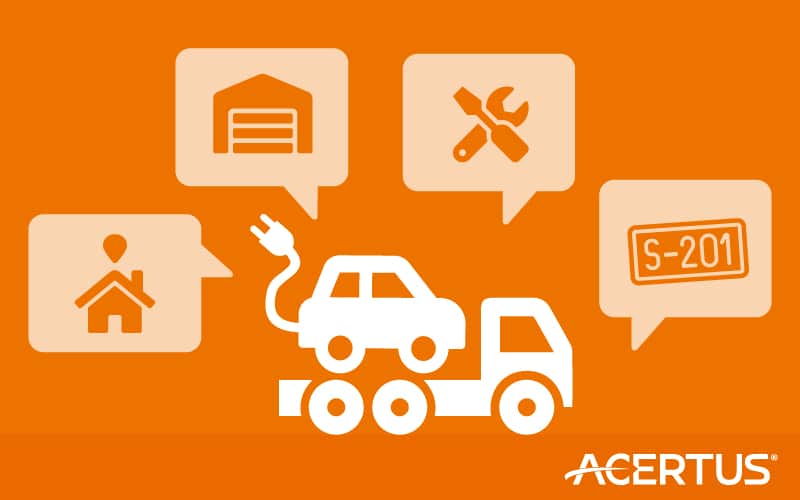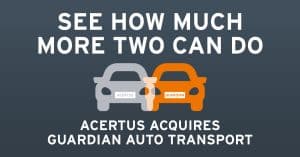Ownership of electric vehicles (EVs) is on the rise. In the US alone, the EV market grew from just a few thousand vehicles in 2010 to more than 315,000 vehicles sold annually from 2018 to 2020. In December 2021, a Morning Consult poll reported that half of US adults (51%) said it’s likely they’ll consider purchasing an EV within the next decade, which was up from just 39% in January 2021.
As more and more consumers choose to buy EVs, an increasing number prefer these vehicles home delivered. Tesla alone increased the number of EVs they deliver by 87% in 2021, a major spike despite the fact Tesla paved the way for vehicle home delivery in the industry by exclusively offering home deliveries until just recently.
This current environment leaves many automotive retailers in a unique position, working not only to source enough EVs to meet this increasing customer demand – but also striving to develop the best logistics program for transporting, servicing and home delivering these vehicles to remain competitive.
The team at ACERTUS has come up with some of the most critical factors to consider when offering customers home delivery on their EV purchases.
Critical Factors When Transporting an EV
Whether driving or hauling vehicles, there are a number of differences between transporting an EV and a fuel-based vehicle. Drivers and carriers, respectively, must be aware of how to handle the nuances of an electric vehicle and its battery’s specific needs. Shippers can choose from car haul, drive-away service or a combination of those modes of transport, depending on what makes the most sense for customer needs and the specific home-delivery routes.
Car haul is ideal for longer transports, or for the first leg of a multi-leg journey. When it comes to hauling EVs, these vehicles weigh significantly more than fuel-based vehicles due to the heavy weight of the batteries. Since federal law mandates that carriers cannot haul more than 82,000 pounds of gross weight, multiple EVs in a single truck reduces the load factor and stretches the carrier’s capacity. In fact, hauling multiple EVs on a truck reduces that carrier’s load factor by about 20%, when compared to a truck filled with similarly sized fuel-based vehicles. Because of this reduction in load factor, capacity is tighter, and transports often take longer.
Drive-away service, where one professional drives the vehicle, is best for shorter transports, routes that are winding or have low-hanging trees or deliveries in urban areas. This mode allows for a more personalized experience and can be tailored to include white-glove level service for the customer.
When it comes to drive away, it’s absolutely critical that drivers be aware of the specific needs of an EV and how to keep the battery in top condition. EV-charging stations aren’t quite as widely available as gas stations. A plan must be made for charging the vehicle, mapping out approximately where the next charge will happen, ensuring the EV battery never gets too close to zero charge throughout the journey. Depending on the transport route, drivers may need to have their own portable chargers in tow to keep the battery at around 20-80% throughout the trip. This is particularly true if drivers are moving vehicles in rural areas where EV-charging stations are less readily available.
Drivers should work to boost range and protect the condition of EV batteries. To help boost battery range while driving EVs, drivers can follow a number of different practices, including:
- Keeping the speed under 60 mph when possible
- Properly inflating tires
- Minimizing lead-footed driving
- Pre-cooling the car or leaving just the fan on in warmer weather
- Reducing heater use in colder weather, especially at full blast
- Avoiding areas with heavy traffic, rough terrain or steep hills
- Timing the charge and not leaving vehicles plugged in unnecessarily
- Leveraging the energy-recovering regenerative brake function when stopping
Ideally, drivers will also have a good grasp of the age and model of the vehicles they’re delivering and will know, approximately, how much range the EVs can achieve.
Critical Services to Ensure Road-Ready EV Deliveries
Successfully home delivering EVs depends on more than just strategic transportation. Oftentimes, vehicles must be stored mid-journey to be detailed, prepped, reconditioned or charged. Carriers and drivers responsible for transporting EVs must be able to store these vehicles in facilities that keep them secure while preventing degradation to the batteries. Because extremely hot temperatures can actually degrade an EV battery, and extremely cold temperatures can reduce range on the battery, it’s crucial that EVs are able to be stored in climate-controlled settings whenever possible.
The teams at such storage locations should have the proper EV knowledge, experienceand infrastructure to charge a wide range of EV models safely and efficiently , and they should have enough familiarity with these vehicles to be able to handle care and maintenance, as well as any necessary repairs – specific to EVs.
Increasingly, customers have the expectation that, as part of the home-delivery program, vehicles are made fully ready-to-drive — which means those vehicles must be titled upon delivery. While title-and-registration work is similar between EVs and fuel-based vehicles, depending on the specific state or territory, there may be specific tax exemptions or fees that apply. In fact, 45 US states and the District of Columbia provide various tax incentives to people who own EVs. At the same time, there are also 28 US states that require special EV registration fees, which usually range between $50 and $200. There are also federal incentives in the US, including a $7,500 tax credit that may increase by $5,000 if the Build Back Better legislation is passed by Congress.
Even though title-and-registration requirements are rapidly changing, it’s critical for customers to be compliant and aware of key incentives or purchasing zero-emission vehicles. An expert title-and-registration team can help streamline this title-and-registration process for retailers and their customers, integrating these steps into a wider home-delivery program and working with retailers to deliver fully compliant EVs that are ready for driving on day one.
ACERTUS as an EV Home-Delivery Partner
ACERTUS works with retailers to establish an end-to-end home-delivery program for EVs, complete with transport options, storage facilities, reconditioning services and title and registration. With the largest carrier network in the country, ACERTUS can uniquely solve current challenges created by capacity limits in the industry, expertly transporting and servicing EVs and shipping them to their new owners.
Operating in all 50 US states, Puerto Rico and Canada, ACERTUS can move any vehicle type, to and from any destination. ACERTUS is equipped with EV-charging infrastructure – both stationary and portable chargers – to help keep EVs moving and vehicles en route to their final drop-off site. ACERTUS even offers a personalized delivery experience, complete with branded white-glove service options, ensuring the critical last mile becomes the best mile for customers.
With more than 55 highly secure and well-positioned storage-and-hub locations, ACERTUS can meet retailers unique EV needed, wherever required across North America. ACERTUS’ storage facilities are well-equipped to keep EVs safe and secure in a climate-controlled setting while charging, prepping or reconditioning the vehicles. All ACERTUS storage facilities also offer care-and-maintenance service, including detailing, repairs, body work and more, guaranteeing that vehicles arrive to customers’ homes in the best-possible condition.
And while EV title-and-registration standards are certainly still evolving, ACERTUS’ title-and-registration team is dedicated to staying up-to-date with the constantly changing policies at both state and federal levels. ACERTUS can ensure EVs are fully titled, registered and compliant before keys are ever handed over to the customer – ensuring EV inventory is kept in motion and made fully ready-to-drive before the final delivery.
Learn more about ACERTUS’ services for electric vehicles, including its full range of shipping and logistics solutions, at https://acertusdelivers.com. To connect with one of our team members or receive a quote, contact us here or call us at: 855-ACERTUS (855-223-7887).





